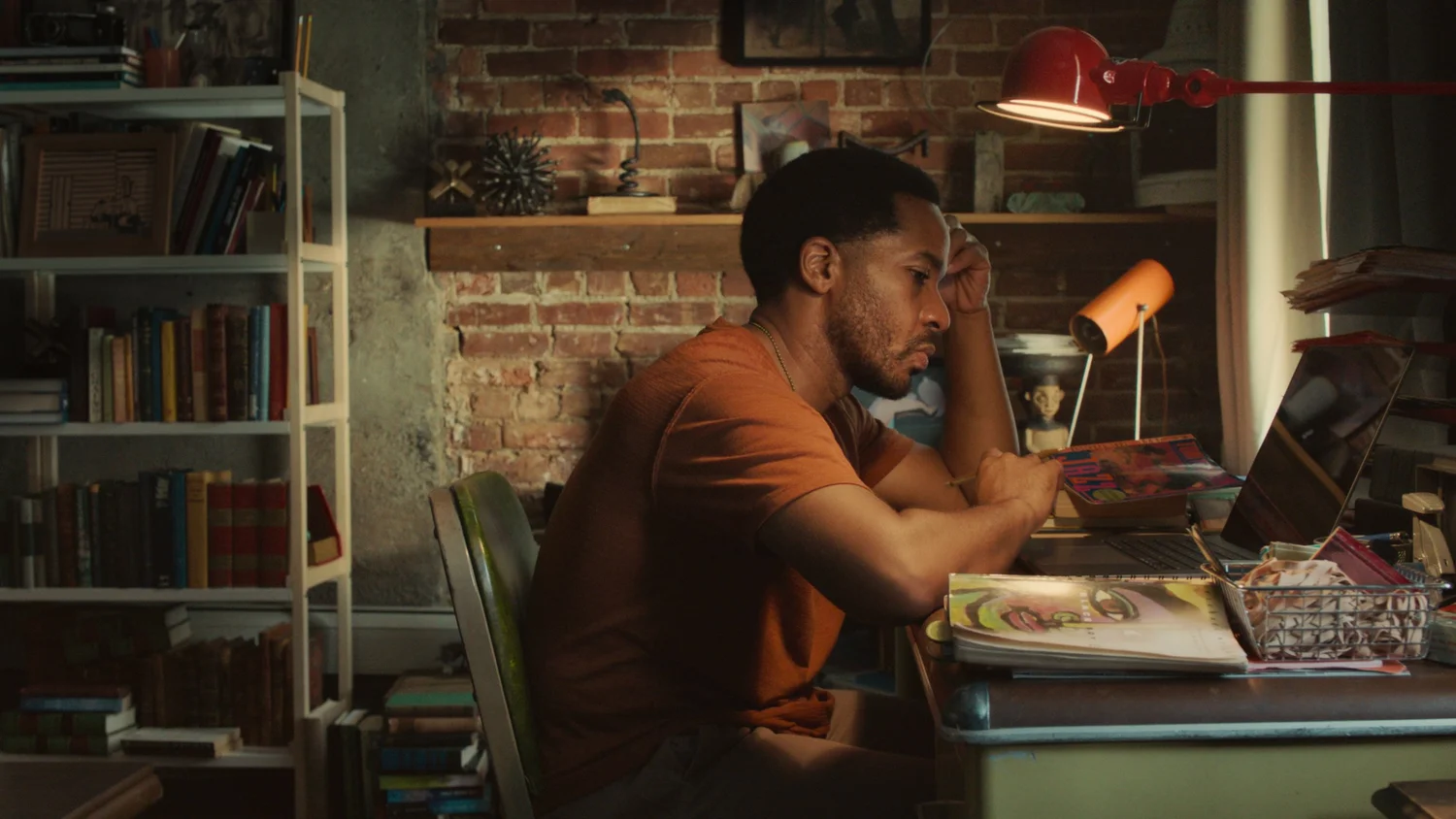Images courtesy of Greenwich Entertainment
LOVE, BROOKLYN— 3 STARS
When you title a movie by its setting, as Rachael Abigail Holder has done with her directorial debut Love, Brooklyn, there’s a sense of selected emphasis. The Sundance Film Festival darling in question is banking on connective notoriety and, to a partial degree, assigning a selling point. For a simplistic example, take Titanic. We’re prepared to see a big boat historically sink. However, James Cameron’s blockbuster epic invests the bulk of its running time in a character-driven love story, completely stealing our hearts in the process. Success can come from that hijacked balance.
LESSON #1: SELECTING EMPHASIS— Nonetheless, filmmakers like Ms. Holder have decisions to make in the name of selected emphasis and hijacked balance. Love, Brooklyn presents a love triangle surrounding a writer in BK, played by superb Moonlight and Exhibiting Forgiveness actor Andre Holland, who is experiencing writer’s block on an essay about the evolution of Bucktown amidst its modern turnover fueled by gentrification. In terms of the chosen setting, make no mistake, there’s a highly reflective narrative there, which could fill several documentaries and fuel many fictional thumbnail stories, including this very film.
Yet, Rachael Abigail Holder makes her choice. She leans on love and lets the rest of the issues orbit like an accompanying breeze. In doing so, Love, Brooklyn offers a bountiful, conversation-driven romantic drama that exudes intelligence, not only in its portrayal of the neighborhood’s dynamics but also in its exploration of the hurdles modern relationships face in such a culturally affluent setting.
Holland plays Roger, a semi-successful writer and resident of Brooklyn. While a shiny MacBook might be open on his desk, he has surrounded himself with little artifacts of analog tech and old school decorations, which harken back to a simpler, thriving era. Instead of owning or using a car, Roger insists on getting around on his vintage 10-speed bike. At the moment, he is facing a deadline from his editor to deliver a promised piece on the so-called modern evolution of Brooklyn. Jaded by the rampant gentrification he has witnessed and carrying a despondent case of writer’s block on the topic, briefly alleviated by joint-delivered ease, Roger finds himself questioning the project and his future. If anything, he would much rather write the opposite perspective of the community’s transformation.
Part of what has dazed Roger’s present senses is his knotty romantic life. He’s currently in a nighttime hook-up relationship with Nicole (DeWanda Wise of the She’s Gotta Have It TV series), a massage therapist and widowed single mother. They openly regard each other’s sexual chemistry as she pines for their relationship to take the next step of quality time, regularity, and exclusivity. That last word of exclusivity is on the list because Roger is still very close to his longest-tenured ex-girlfriend, the local art studio owner Casey (Miss Juneteenth’s Nicole Beharie). The old flames are very amicable and stand as each other’s emotional confidantes.
LESSON #2: ONE ARTISTIC MIND BONDING TO ANOTHER— True to the love triangle concept at hand in Love, Brooklyn, Roger (and we in the audience) has an unenviable choice to make. Reigniting the passionate cauldron with Casey represents familiarity and bonding with an intellectual equal. Taking a page from Richard Linklater, Holder grants several sequences for Holland and Beharie to saunter through the beauty of the Borough of Homes and Churches, discussing art and their mid-life challenges. There’s a possible future for Roger where Casey is a great match.
LESSON #3: LOOKING FORWARD INSTEAD OF LOOKING BACK— In one dynamite scene (that bolsters Lesson #2) when Casey and Roger and discussing the painted themes of “Destruction of Sodom and Gomorrah” by celebrated African-American artist Henry Ossawa Tanner, Turner symbolically uses the painting and their conversation to speak truth to the conflict and comparison of people who look forward and venture into new chapters of life versus those who look back and live in the past. That theme becomes the entire crux of the movie, hitting Roger right between the eyes, since advancing a solid, new relationship with Nicole means putting Nicole in the past. With greater goals than the norm, the question is which way leads to better learning, more than purely physical attraction.
The wavering strength of Love, Brooklyn rests on the shoulders of Andre Holland’s lead. This crucial crossroads is thrust upon a commitment-phobic character and a defined “incurable fuck-up.” Even with his married best friend, Alan (comedian Roy Wood Jr. in a very nice supportive performance), figuratively massaging his shoulders and ego during regular coffee shop meetings, Roger can’t get out of his own way to make choices with clarity. He’s not grossly insufferable, thanks to classic “not everything is about you” and “you don’t know what you want” characterization, but he veers too closely in that direction with the verbal feet he puts in his mouth. Being the hangup doesn’t make him the bad guy of his own movie, just the one who needs the most work in the discovery and honesty departments.
Nonetheless, Love, Brooklyn is appreciably a villain-less picture, where Roger is shown to be greatly improved by and with both women, which is a credit to the excellent performances by Nicole Beharie and DeWanda Wise. Holder’s script grants them vibrant personalities, confident poise, and a level of honest and forthright independence that doesn’t require Roger. Their engaging brightness lifts the whole film from male-centered doldrums. As with solid love triangle movies, the choice and path towards who gets, not so much the final declaration of love, but the conscientiously chosen approach to go further, will keep us on pins and needles. In a way, Roger doesn’t deserve either one of them, and vice versa, yet there’s a climactic decision that arrives with fitting satisfaction.
That said, the result of newfound happiness circles back to Lesson #1 and the notion of selecting an emphasis. Like the love letter sign-off of its title, Love, Brooklyn speaks platitudes and layers reverence for its urban setting in fits and spurts during the entire film. There is a version of this movie that could have deepened the homespun roots and increased the threads of Black culture and Brooklyn. Instead, it sides with the romance. Those viewers looking for a deeper socioeconomic examination or hefty cultural treatise that would lift Love, Brooklyn to a “message movie” tier, so to speak, will be disappointed. Even so, the love triangle journey and anticipation earn enough emotive stimulation, a pull that might have been taken away by a different emphasis or passion elsewhere.



